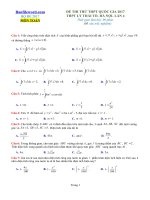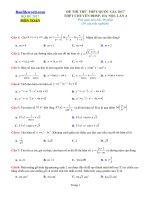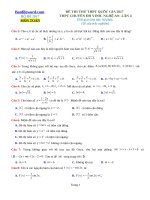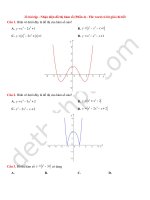50 cau hoi Kiem tra Unit 4 File word co loi giai chi tiet
Bạn đang xem bản rút gọn của tài liệu. Xem và tải ngay bản đầy đủ của tài liệu tại đây (142.53 KB, 9 trang )
Choose the word or phrase (A, B, C or D) that best completes each sentence.
Câu 1: “Do you know how this machine work?”
“All you do is just ________ this button and it starts automatically.”
A. pull
B. put on
C. press
D. switch
Câu 2: You can't use the washing machine today. It's ________.
A. out of work
B. out of order
C. breaking down
D. wrong
Câu 3: This ________ is great! I don't have to leave my chair when I want to change channel
on the TV
A. cordless phone
B. remote control
C. digital control
D. control button
Câu 4: Modern home entertainment system and other ________ are changing everyone's life.
A. innovations
B. modern discoveries C. new creations
D. developments
Câu 5: The constant power failures made it difficult ________ a computer.
A. for using
B. for us using
C. to use
D. in using
Câu 6: My brother is ________ at fixing household appliances. I’m sure he can help you.
A. a poor hand
B. an old hand
C. a new hand
D. on hand
Câu 7: ________ the technological revolution is opening up a whole new world, many
people are worried by it
A. However
B. Despite that
C. Because of
D. Although
Câu 8: The new computer system ________ when I went there the other day.
A. was demonstrating
B. had demonstrated
C. has been demonstrated
D. was being demonstrated
Câu 9: Most computers have enough memory to store ________ of information
A. a great number
B. a large number
C. a vast amount
D. large amount
Câu 10: You may feel strange and difficult at first, but within a year or so, you ________ all
their customs
A. will learn
B. will have learned
C. will have been learning
D. are going to learn
Câu 11: ________, the cell phone is not good for our health.
A. According to my opinion
B. In my opinion
C. As I believe it
D. I would mind that
Câu 12: ________ the container from the base, turn it counterclockwise.
A. To remove
B. You remove
C. Removing
D. By removing
Câu 13: Without the help of labour-saving devices such as the washing machine, and the
microwave, our parents ________ very busy all day long.
A. were used to be
B. didn't use to be
C. used to be
D. had been
Câu 14: Isn't there anyone ________ of using this digital camera?
A. skilled
B. possible
C. capable
D. affordable
Câu 15: These quick and easy _______ can be effective in the short term, but they have a
cost.
A. solve
B. solvable
C. solutions
D. solvability
Câu 16: Electronic music is a kind of music in which sounds are produced __________
A. electron
B. electric
C. electronic
D. electronically
Câu 17: Writer Ernest Hemingway is known for his __________language and his lively
dialogue.
A. simplification
B. simple
C. simplistic
D. simplicity
Câu 18: How many ___________ took part in the 22nd SEA Games?
A. competitors
B. competitive
C. competes
D. competitions
Câu 19: Boys often enjoy doing things in a ___________ way.
A. create
B. creative
C. creativity
D. creatively
Câu 20: The problem of ________ among young people is hard to solve.
A. employment
B. employee
C. employers
D. unemployment
Câu 21: The jet engine has had ________ on life since the twentieth century.
A. a great impact
B. an important affect C. an important part
D. great significance
Câu 22: The children ___________ high grade at school.
A. achieve
B. achievement
C. achievable
D. achieving
Câu 23: He spoke ________ to her, and she began crying immediately.
A. insensitivity
B. insensitiveness
C. insensitively
D. insensitive
Câu 24: When the automobile salesman described the car so _________, we became very
uneasy about buying it.
A. ambiguity
B. ambiguousness
C. ambiguous
D. ambiguously
Read the text and choose the word or phrase (A, B, C or D) that best fits each space.
How to protect children web fans from unsuitable material online while (1) ________ them to
use
the
Internet
has
long
been
discussed
in
the
U.S.
For some parents, the Internet can seem like a jungle, filled with danger for their children.
But jungles contain wonders as well as hazard and with good guides, some education, and a
few precautions, the wilds of the Internet can be safely (2) ________. "Kids have to be
online. If we tell our kids they can't (3) ________ the Internet, we're cutting them off from
their future," said an expert.
Most kids have started to use search engines. Many of them are great for finding tons of
interesting Internet sites, and they can also (4) ________ places where you might not want
your kids to go. There are search engines (5) ________ just for kids. A certain software
contains only sites that have been selected as safe. The most popular way to limit access
would be to use what is known as a "content screener". But this can't be wholly (6)________,
and the best thing parents can do is to talk to their kids and let them know what is OK or not
OK to see or do on the Internet. Another way is that mum or dad is nearby when the child is
surfing the Internet.
A few other tips: - Don't put the PC in a child's room but keep it in an area where mum or dad
can keep (7)________ things. That also makes the Internet more of a family activity.
- Ask your child (8) ________ he or she has been doing and about any friends they make
online.
- Tell your child not to give on-line strangers (9) ________ information, especially like
address and phone number.
- And tell your children never to talk to anyone they meet online over the phone, send them
anything, accept anything from them or agree to meet with them (10) ________ you go
along.
Câu 25: A. encourage
B. encouraging
C. we encouraging
D. encouraged
Câu 26: A. navigated
B. ridden
C. constructed
D. inhabited
Câu 27: A. have approach to B. download
C. make use
D. have access to
Câu 28: A. locate
B. browse
C. surf
D. browse
Câu 29: A. explored
B. built
C. designed
D. purchased
Câu 30: A. responsible
B. reliable
C. available
D. worthwhile
Câu 31: A. away from
B. an .eye on
C. pace with
D. in touch with
Câu 32: A. that
B. whether
C. what
D. how
Câu 33: A. individual
B. personnel
C. detailed
D. personal
Câu 34: A. unless
B. when
C. in case
D. although
Choose the sentence (A, B, C or D) that is closest in meaning to the one provided in
italics.
Câu 35: The job doesn't involve regular hours, which is why people like it.
A. The reason why people like the job is because it doesn't involve regular hours
B. People like the job when doesn't involve regular hours.
C. The job which people like most doesn't involve regular hours.
D. The job doesn't involve regular hours, that's why people like it.
Câu 36: Who disagrees with our intention to go on strike?
A. Is there anyone who don't want to go on strike?
B. Who does not plan going on strike?
C. Who does not go on strike?
D. Is there anyone not in favour of our going on strike?
Câu 37: It is possible that Jane has been delayed.
A. Jane may well have been delayed.
B. It is likely that Jane will be delayed
C. Jane will probably have been delayed.
D. Jane must have been delayed.
Câu 38: He is said to be a hard bargainer.
A. People say he hardly bargains
B. It is said that he bargains hardly.
C. He has a reputation as a hard bargainer.
D. He says it is hard to be a bargainer
Câu 39: This conference wouldn't have been possible without your organisation.
A. Had you not organised this conference, it wouldn't be possible.
B. Your organisation made it possible for this conference to take place.
C. But for your organisation, this conference would have been possible.
D. If you didn't organise, this conference wouldn't have taken place.
Câu 40: It took the firefighters ten hours to put out the fire.
A. After ten hours the firefighters could put out the fire.
B. After ten hours the firefighters were able to put out the fire.
C. It was ten hours that the firefighters were able to put out the fire.
D. The firefighters couldn't put out the fire after ten hours.
Câu 41: The only thing they didn't steal was the television.
A. They only stole the television.
B. They stole everything in the house, including the television.
C. They took everything except for the television.
D. The television was the only thing that was stolen
Câu 42: There's hardly anything Tom doesn't know about computers
A. Tom knows nearly everything there is to know about computers
B. Tom doesn't know anything about computers.
C. Everything about computers is too hard for Tom to know.
D. Tom hardly knows anything about computers.
Read the text and choose the word or phrase (A, B, C or D) that best fits each space.
Time For A Change Liza Cooke works (1) ________ VSO, a voluntary charity organization. For
the last three years she (2) ________ English in a primary school in a small village in Nigeria.
Before that she lived with her parents in a (3) ________ house in Croydon, and worked in an
office in north London. Her life changed dramatically after she decided to join VSO
(4)________ volunteer worker.
I used to travel to work every day by train. The journey would take (5) ________ forty minutes
and an hour. Now it only takes me a few minutes. I used to work in a large office with about
thirty other people. Now I teach classes of up to fifty children. I still work (6) ________ - well,
more of less. The classroom has walls but no windows! I used to hate my office job. It was so
boring. But teaching is so different - I really enjoy it.
Of course, working in an office and living at home (7) ________ that I had a lot of free time. I
would go out every night of the week and enjoy myself. I never stayed at home. Now I find I
have hardly (8) ________ free time, but I don't mind. I seem to spend most of my free time doing
volunteer work
Câu 43: A. for
B. with
C. at
D. in
Câu 44: A. taught
B. has taught
C. teach
Câu 45: A. semi-detached
B. half detached
C. detaching D. part-detached
Câu 46: A. with a
B. such as a
C. like a
D. as a
Câu 47: A. from
B. between
C. about
D. at about
Câu 48: A. inside
B. interior
C. indoors
D. internal
Câu 49: A. were
B. involved
C. meant
D. explained
Câu 50: A. some
B. any
C. little
D. no
LỜI GIẢI CHI TIẾT
Câu 1: Đáp án C
D. am teaching
Dịch nghĩa: Bạn có biết cái máy này vận hành như nào khơng? – Tất cả những gì bạn cần làm
là ấn nút này và có sẽ tự động khởi động
Pull : kéo
Put on: mặc vào
Swich: chuyển (tắt, mở, gạt)
Press: nhấn xuống, ấn vào
Câu 2: Đáp án B
Dịch nghĩa:Bạn không thể dùng máy giặt này hơm nay.Nó đã hỏng khơng thể dùng máy giắt
hơm nay, nó hỏng rồi Out of work : thất nghiệp Out of order: hỏng (máy móc)
Câu 3: Đáp án B
Dịch nghĩa:Cái điều khiển từ xa này thật tuyệt! Tôi không phải rời khỏi ghế khi muốn đổi
kênh TV
Remote control: điều khiển từ xa
Câu 4: Đáp án A
Innovation: sáng kiến cách tân
Modern discovery: phát hiện hiện đại
New creation: những sự giải trí mới
Development: sự phát triển
Dịch nghĩa:Hế thơng giải trí tại nhà hiện đại và những sáng kiến khác đang thay đổi cuộc
sống của mỗi người
Câu 5: Đáp án C
Dịch nghĩa:Mất điện liên tục làm cho việc sử dụng máy tính trở nên khó khăn
Be difficult to do st: khó để mà làm gì
Câu 6: Đáp án B
Dịch nghĩa: Anh trai tơi là người có kinh nghiệm sửa chữa thiết bị gia dụng. Tôi chắc là anh
ấy có thể giúp cậu
An old hand: người và có nhiều kinh nghiệp và có nhiều sự rèn luyện
Câu 7: Đáp án D
Dịch nghĩa: Dù cuộc cách mạng công nghệ đang mở ra một thể giới mới, nhiều người lo lắng
về nó
Although + clause : mặc dù
Câu 8: Đáp án D
Dịch nghĩa: Hệ thông máy tinh mới đang được trưng bày khi tơi đi qua đó hơm trước
Thì QKTD thể bị động có dạng : S+ was/were being + PII
Câu 9: Đáp án C
Dịch nghĩa: Hầu hết máy tính có đủ bộ nhớ để lưu trữ một lượng thơng tin lớn
Amount dùng với danh từ không đếm được ‘information’ A vast amount of st = a large
amount of st
Câu 10: Đáp án B
Dịch nghĩa: Ban đầu có thể bạn thấy kì lạ là khó khan, nhưng trong khoảng một năm, bạn sẽ
học được hết các tục lệ của họ
Diễn tả hành động sẽ được hoàn tất vào một thời điểm cụ thể trong tương lai “within a year or
so”, ta dùng thì TLHT
Câu 11:
Câu 22: Đáp án A
Giải thích:Achieve (v) đạt được
Achievement (n) thành tự
Achievable (adj) có thể đạt được
Phương án A
Dịch nghĩa: Những đứa trẻ đạt được điểm cao ở trường
Câu 23: Đáp án D
Giải thích:Intensitive (adj) khơng cảm xúc, vô hồn
Intensitively (adv) một cách vô hồn, không cảm xúc
Insensitivity = insensitiveness (n) sự vô hồn, sự mất cảm xúc
Bổ nghĩa cho động từ là một trạng từ
Phương án C
Dịch nghĩa: Anh ta nói với cơ ấy một cách hững hờ, và cơ ấy đã bắt đầu khóc ngay lập tức
Câu 24: Đáp án D
Giải thích:Ambiguous (adj) nhập nhằng, tối nghĩa, nước dơi
Ambiguously (adv) một cách tối nghĩa, nhập nhằng
Ambiguousness (n) sự tối nghĩa, nhập nhằng
Ambiguity (n) sự nhập nhằng, tối nghĩa
Phương án D
Dịch nghĩa: Khi người bán hàng miêu tả chiếc xe một cách nhập nhằng, chúng tôi bắt đầu
cảm thấy không thoải mái về việc mua chiếc xe đó
Câu 25: Đáp án B
encouraging them to use the Internet:cho phép chúng sử Internet
Câu 26: Đáp án A
Navigate(v):lái,đem thông qua(br)
Ride(v): đi,lái(br)
Construct(v):xây dựng(br)
Inhabit(v):ở,sống ở nơi nào
Câu 27: Đáp án D
Have access to sth:có sự tiếp cận với cái gì
Câu 28: Đáp án A
Locate(v):xác định vị trí
Browse(v):đọc lướt qua,xem lướt qua
Surf(v):lướt sóng
Travel (to) V: đến đâu
Câu 29: Đáp án C
Explore(v):thăm dò,thám hiểm
Design(v):thiết kế
Build(v): xây
Purchase(v):mua,tậu
Câu 30: Đáp án B
Responsible(adj): có trách nghiệm
Reliable(adj): đáng tin cậy
Available(adj):sẵn có để dùng,có sẵn
Worthwhile(Adj):đáng giá,bõ cơng
Câu
tính
Câu 43: Đáp án A
Work for: làm việc cho cơ quan
Câu 44: Đáp án B
For the last three years:dấu hiệu thì hiện tại hồn thành
Câu 45: Đáp án A
Semi-detached house(adj): nhà nửa tách rời
Câu 46: Đáp án D
Join….as a:tham gia với tư cách là
Câu 47: Đáp án B
Take between..and…:diễn ra vào khoảng thời gian nào
Câu 48: Đáp án C
Work indoors(v):làm việc trong nhà
Câu 49: Đáp án C
Mean that+clause: có nghĩa là
Câu 50: Đáp án B
Have hardly any time: gần như khơng có thời gian
31:









